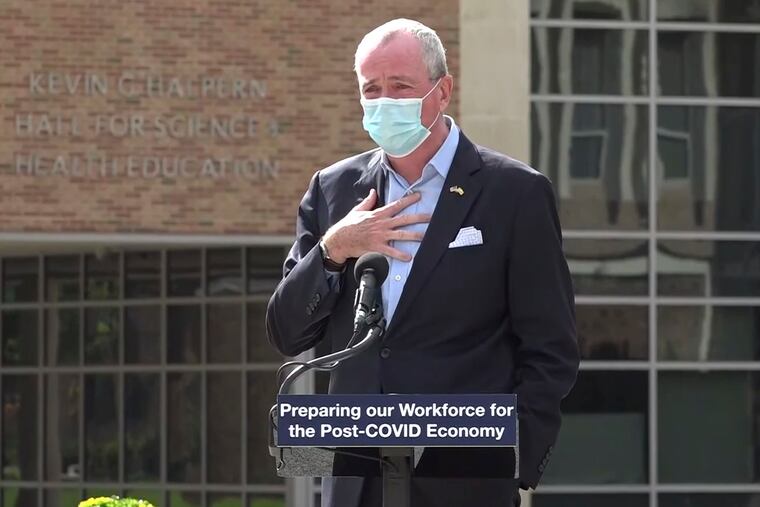Coronavirus case numbers keep trending upward; Gov. Phil Murphy in quarantine after staffers infected
Sources say a deputy chief of staff tested positive. Pennsylvania is averaging close to 1,500 new cases a day.

After announcing that COVID-19 hospitalizations were higher than they have been in months and that New Jersey had added 1,000 new cases, Gov. Phil Murphy disclosed that he, himself, was about to go into quarantine.
On a day that Pennsylvania and Philadelphia said upward trends in cases were continuing, Murphy was informed Wednesday that a staff member — identified by sources as Mike DeLamater, Murphy’s deputy chief of staff for intergovernmental affairs — with whom he had come in contact during the weekend, had tested positive for the coronavirus.
Later in the day, the governor’s office said that Daniel Bryan, a senior communications adviser to Murphy, also tested positive but was asymptomatic. The office declined to confirm that the other staffer is DeLamater or whether he was symptomatic.
Murphy, who in February underwent surgery to remove a kidney tumor, said that while he and his wife, Tammy, had tested negative Wednesday, they would quarantine through the weekend out of “an abundance of caution.”
Murphy’s disclosure added a significant element of drama to a media event at Camden County College in Blackwood, where he and other South Jersey elected officials unveiled plans for a workforce development program funded by federal coronavirus relief money.
» READ MORE: Rush to dole out billions in coronavirus relief dollars in Pa. could lead to waste, fraud
Rep. Donald Norcross (D., N.J.) spoke after Murphy’s initial remarks, but then the governor returned to the lectern. “I will now, unfortunately, have to take myself off the field,” he said. He then left the event.
New Jersey also reported 18 new deaths Wednesday. Murphy said the rising case numbers pointed to the persistence of the virus.
“It remains with us," he said. "It’s surging over the past several weeks.”
Adjusting for population, the daily new-case numbers appeared comparable to Pennsylvania’s, which have averaged close to 1,500 during the last week, according to an Inquirer analysis, close to the high-water marks of April.
Philadelphia added 233 cases with Wednesday’s report; the average for the seven-day period that ended Saturday was 189.
The state’s positive test rate, 4.5%, is just shy of the 5% danger mark established by the World Health Organization and is the highest since August. The state reported 29 new deaths on Wednesday. More than 8,500 Pennsylvania residents have died after contracting the virus, with about two-thirds of those residents of nursing homes or personal-care facilities.
» READ MORE: Nursing home COVID-19 case, death data still missing from Pa.’s public reports
Delaware evidently is one place that has made strides in containing the virus. Its daily case numbers have been relatively flat this month. New Jersey has announced it no longer will enforce its quarantine restrictions on people traveling in from the Diamond State.
But Delaware is clearly an exception nationally: New Jersey added Maryland and Arizona to its travel advisory Tuesday, increasing the number of states and territories on the list to 39.
» READ MORE: What to know about the 14-day quarantine requirement for New Jersey, New York, and Connecticut
And the coronavirus appears to be rallying in parts of Europe that evaded the worst of the first wave of infections.
Recent surges have been most evident in parts of Central and Eastern Europe in nations praised for low case numbers during the summer. Some countries in Latin America, South Asia, and the Middle East also have seen increases.
“Countries that have avoided the first waves have no reason to be complacent,” said Yanzhong Huang, a senior fellow for global health at the Council on Foreign Relations, adding that some countries avoided the first wave of the 1918 flu pandemic only to be hit harder later. “It might be a cursed blessing.”
In the hope department, the Penn State College of Medicine is the latest to show that mouthwashes, nasal rinses, and even very diluted baby shampoo can kill coronaviruses by rupturing the microbes' fatty shells.
» READ MORE: Penn State study says mouthwash can kill coronavirus — in lab dishes. Human trials are next.
One caveat: The experiments were performed in lab dishes, not on people. And the Penn State scientists used cousins of the pandemic coronavirus, because the real thing can only be studied in labs with extra biosecurity.
“A German group recently corroborated our results” with its own lab experiments, said Craig Meyers, the Penn State professor of microbiology, immunology, obstetrics and gynecology who led the study, published this week in the Journal of Medical Virology.
Meyers cautions, “We’re not putting this out as a replacement for masks and social distancing."
Inquirer staff writers Laura McCrystal, Marie McCullough, and Robert Moran, along with the Washington Post contributed to this article.